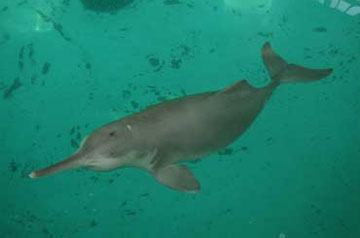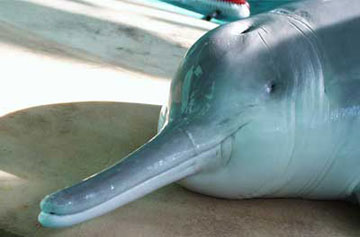The news came and went with an alacrity that I found alarming, almost jolting. I waited for weeks, faithfully; I could not believe that the initial announcement would be followed by nothing but silence on the issue, no rationalizations, no opinions, no discussions, no outpourings of grief. Just silence.
The Goddess of the Yangtze’, the baiji, was gone from this earth and it seemed the extinction equaled the importance of, say, Captain America’s more recent and fictional death. It is during such times that I wonder if people really understand what extinction means. It is not the death of an individual; it’s a species—wholly unique in the world—that will never again grace the planet. Furthermore, this extinction was not brought on by natural cataclysm or selection; this was a species driven to extinction—not even intentionally (i.e. for food or survival) but apathetically and dumbly—by another species. I thought such a global loss deserved a little more press and certainly more feeling.

The Baiji or Yangtze River Dolphin. Photo by Wang Ding and courtesy of the Institute of Hydrobiology, Chinese Academy of Sciences. A short farewell? Baiji populations have steadily declined since China declared the species endangered in 1979. In 1986 official estimates placed the Baiji population around 300 but an extensive survey in 1998 found only 7 individuals. The last confirmed sighting was in 2004 and the last captive baiji, Qi Qi, died in 2002 at the Institute of Hydrobiology in Wuhan. The Chinese government had set up a reserve in a lake in Hubei province to protected any captured baiji, but the attempt apparently came too late to save the species. more >> |
I cannot speak to the press coverage in Asia, but in the United States it proved dismal. There is often a phrase used by media-skeptics who proclaim that in the U.S. media one American’s death is worth (fill in the blank: twenty Italians, a hundred Chinese, five-hundred Peruvians, a thousand Africans?). The same can be said for the extinction of a species. Looking through numerous western online media sites (BBC, CNN, MSNBC, Fox News, The New York Times) I discovered that only one of them carried more than a single on-line article related to the extinction of the baiji. The New York Times carried both a regular article (short and badly written) and an opinion piece. The BBC issued just one basic article, but had published a series of earlier articles regarding the expedition that would ultimately determine the baiji’s extinction. I found nothing on CNN’s site; I assume they carried the story, but that it was merely unavailable in their archives. Both MSNBC and Fox News felt the story small enough to sport just the obligatory AP article. Searches in the archives of more alternative media, like Slate.com and Salon, produced nothing, while National Geographic—America’s bastion for mass-environmental awareness—produced no more than the rest: a single on-line article.
So, to what can we equate the extinction of this marine mammal? The shaven head of Britney Spears surpasses it, as does the minor spat between Clinton and Obama over one of Obama’s supporters. And what can be said about Anna Nicole Smith’s death? The media coverage of that story probably exceeded the 2004 Tsunami which killed 300,000 people, so really it’s pointless to even attempt a comparison to the baiji’s extinction. The river dolphin’s demise probably equals a few deaths in Iraq (which also doesn’t compare to Britney’s shaved head) or YouTube’s first video awards.
It wasn’t just the lack of press that the baiji received that frustrated me, it was also the quality. The New York Times began its article on the baiji’s extinction by making the claim that it was not a member of charismatic sea mammals that have long been the focus of conservation campaigns’, seemingly condemning the animal because it lacked the charisma’ required by humanity to be allowed to survive on this planet. The BBC network devoted just a minute and thirty-three seconds to the extinction; its online article was little better, just over 200 words. Even National Geographic’s online article was bland. Each of these article’s mentioned similar fact such as the baiji is the “first marine mammal to go extinct since the monk seal in the 1950’s”, highlighted the animal’s “blindness” “deafness” and “small size”, and gave a rout list of the causes of extinction, namely “over-fishing, collisions with ships, dams, traffic messing with the dolphins’ sonar” etc. No article attempted to further illuminate these causes or to analyze China’s large environmental crises. And while most articles mention the rare fin-less porpoise (a mammal that also lives in the Yangtze), none of the articles used the baiji’s extinction as an opportunity to address our current Age of Extinction: no statistics on bio-diversity, no discussion of saving species on the brink, just glib coverage.
So, considering the lack of press, here is my attempt to give the baiji a little of the elegy it deserves. The Goddess of the Yangtzee was one of four species of freshwater dolphin: two in the Amazon river system, one in Ganges, and the baiji itself. Its beak curved upright slightly and, similar to other river dolphins, was long and thin. This proved useful when the mammal would hunt by poking and digging in the mud for fish. The color of the baiji ranged from blue to gray to brown; its underside was a creamy white. The baiji was deaf and nearly blind; I mention this only because much was made of it in the news (at times seeming to imply that the mammal deserved extinction); however employing such terms means viewing the dolphin from a human perspective. If a species is blind or deaf, it is simply because it has no need of these senses to survive. In the muddy waters of the Yangtze, the baiji saw’ through its sonar. The baiji had a characteristic whistle and could make several different clicks. Using echolocation—and presumably these sounds—the baiji would hunt for food in groups of two to six individuals. These groupings seem to imply that the baiji were social mammals like their ocean cousins. It does not seem much of a stretch then to assume they were intelligent, yet little is known of baiji life. From a single individual lifespan is guessed at twenty-four years, but nothing is known of their social interactions. Watching rare footage of the baiji is like entering a secret, ancient room. One sees a graceful and beautiful animal; their slightly humped-back does not move, so as they swim their tail and head create a perfect watery curve.

The Baiji or Yangtze River Dolphin. Photo by Wang Ding and courtesy of the Institute of Hydrobiology, Chinese Academy of Sciences. |
The baiji went extinct because of simple ignorance and greed. Most people were simply ignorant of its existence (so its disappearance hardly surprises us). China’s greed for modernization’—and its desire to become a new America—have led it to create increasingly appalling environmental situations. Like America it makes decisions without looking at the long term questions, and based primarily on wealth accumulation for a minority. China’s inability to aid and educate its many impoverished citizens also led to the baiji’s demise: these impoverished citizens did not heed regulations meant to protect the baiji. It is always interesting that bringing people out of desperate poverty and preserving species go hand-in-hand.
Despite my deepening disillusionment and sorrow at the river dolphin’s disappearance, I should probably rejoice that the baiji received any coverage. It is estimated that every day almost one hundred and fifty species go extinct. Wrap your head around that. Of course, to be noticed by humanity the species that disappears has to be large (bigger is better) and “charismatic” (thank you The New York Times). This pretty much cuts out all plants, fungi, insects, fish, and most birds and reptiles. We are damning innumerable species (and ecosystems) simply because the general public does not gravitate toward them at the zoo. If these patterns continue, the earth will soon be a world of only a few species; it will become a lonelier, sicklier place, a dead land. But what really keeps me up at night is this: what right do we have to wantonly destroy innumerable species? Do they not live just as we live? Is this not their world as much as it is ours? Human wrought extinction is an act of great immorality, perhaps among the greatest we have committed. One day we may realize that the baiji deserved better than to have its home ravaged for plunder. One day we may realize that its end deserved a reaction equal to the twenty million years it spent on this shared planet.
About Jeremy Leon Hance
Since graduating in 2002 from Macalester College, Jeremy has been fortunate enough to travel to three continents, live a year in New York City, manage a
co-op in a small town on the wind-swept Minnesota prairie, and spend a precious morning watching a family of Giant River Otters fish and play in
the Amazon basin.